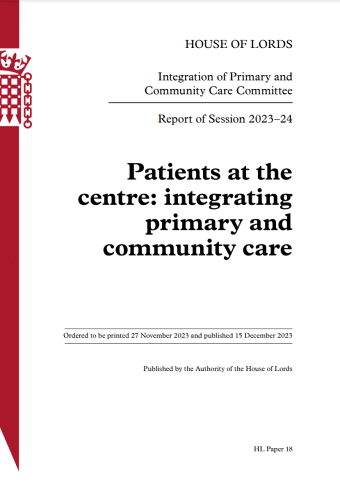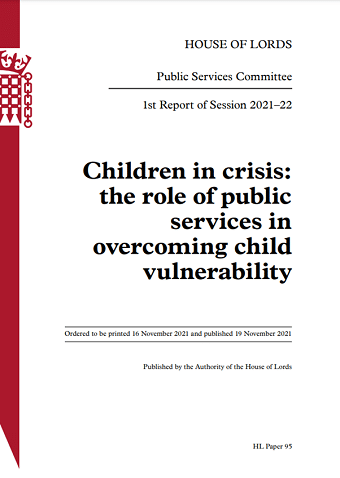Today, the House of Lords Primary and Community Care Committee published its report ‘Patients at the centre: integrating primary and community care’, in response to the consultation it held earlier this year.
The consultation explored the many challenges facing primary and community care and the sustainability of the NHS. These include high service demand, an ageing population, workforce shortages and insufficient preventative care. The Committee explored how integrating services could address these challenges and sought evidence from clinicians, community care services, local authorities, researchers and voluntary organisations from across the country.
The Institute of Health Visiting was asked to contribute to the consultation and we did this in a number of ways:
- Alison Morton, iHV CEO, submitted written evidence in April 2023.
- Professor Sally Kendall MBE, who is one of the iHV’s four founding health visitors and an Honorary Fellow, presented oral evidence as a witness.
- Sarah Cartner, a member of the iHV’s Health Visitor Advisor Forum, and a health visitor from Newcastle Upon Tyne Hospitals NHS Foundation Trust, also represented the iHV at a roundtable event hosted by the Committee at the Palace of Westminster – read her Voices blog.
We were delighted to see that health visiting has been recognised as a key sector of the health service, within the report. The report also highlights the challenges of workforce shortages and fragmented models of care, alongside the hugely valuable service that health visiting provides to GPs and families. Evidence from Professor Campbell, Professor of General Practice and Primary Care at the University of Exeter is cited. He states, “Health visiting … has been hugely valued by GPs and their teams, but it is now no longer really part of general practice. Sadly, we have lost so many health visitors that we do not know who these people are or where they are. They provide a hugely valuable service, safeguarding and supporting families and people with long-term conditions.”
Alison Morton, iHV CEO, commented:
“We are delighted to see that health visiting has been recognised as a key sector of the health service by the Committee. The report also highlights the very real challenges of workforce shortages and fragmented models of care that are having a significant impact across the whole health and care system.
“In his evidence, Professor Campbell, Professor of General Practice and Primary Care, speaks for many GPs, highlighting how much they value health visitors and the work that they do to safeguard and support all families. He also raises valid concerns about the impacts of the depletion of the health visiting service in recent years which is hampering collaborative working. Close working relationships between health visitors and GPs are vitally important to support their collective work with all babies, young children and families, and particularly those living with complex conditions, risk and vulnerability. We share the Professor’s concerns and support the recommendations in this report. To deliver better joined-up care, we urgently need more health visitors.”
The Integration of Primary and Community Care Committee Report’s has 4 key recommendations:
- Structures and organisation of NHS services need to be streamlined. Integrated Care Systems (ICSs) are a good starting point for collaborative working but their relationship with other healthcare bodies, public bodies, and local government must be based on mutual professional respect. The Department of Health and Social Care (DHSC) should evaluate ICS structures before implementing any major health service reforms.
- There needs to be a more simplified and flexible system for awarding contracts and allocating funds within the NHS to encourage multi-disciplinary, integrated working. DHSC and NHS England (NHSE) should reform the contract process and ensure new contracts are flexible in the commissioning of primary care. The Government should explore different ownership models for GP practices to facilitate more joined-up and better care.
- Efficient data-sharing is crucial to successful healthcare integration. Fragmented systems often require patients to repeatedly provide the same medical information, causing frustration. A properly maintained Single Patient Record (SPR) and the ability for intersectoral data-sharing between healthcare professionals are essential to tackle this issue. The DHSC must issue guidance to standardise data practices and clarify data sharing within privacy laws, to ensure timely patient access to medical data.
- Equipping staff to work across multiple clinical disciplines through improved training will make integration of services easier. Currently, staff spend more time meeting everyday demand, rather than implementing new integration strategies. Clinicians should be introduced to the work of other services through job rotations. Social care needs should also be included in the NHS’s Long Term Workforce Plan to ensure that enough well-trained social carers are available.
Sally Kendall MBE, Professor of Community Nursing and Public Health at University of Kent, said:
“Despite some strong evidence to the Committee in relation to integration across all community services, it is disappointing that children’s health does not receive a lot of specific attention in the report. Childhood is lived in the home (wherever that may be), school, nursery and neighbourhood. There is a huge opportunity for ICBs to come together with local authorities and the NHS and voluntary sector to integrate health for all children and close the inequality gap. This opportunity may be lost for future generations of children if ICBs do not recognise the importance of the community services such as health visiting and school nursing and their navigational role with primary care and other community services to ensure that children’s health and safeguarding needs are met.”
Links for further reading:
- Report: Patients at the centre: integrating primary and community care (PDF)
- News story: Patients at the centre: integrating primary and community care
- Read a transcript of Professor Sally Kendall’s oral evidence










